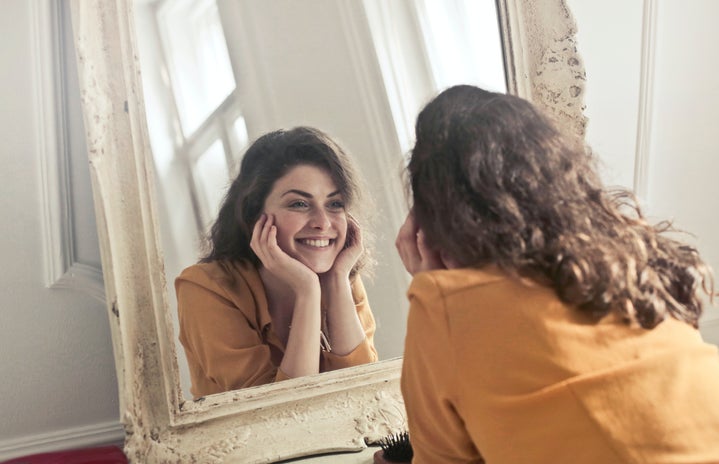I am a Scorpio. Allegedly, we are mysterious, stubborn, and know how to keep a secret. I am none of those things. And yet, I’ve bought unnecessary amounts of Scorpio-themed jewelry, notebooks, and other various merchandise. I think I just love to feel like I’m a part of something. Don’t we all?
I’ve always felt like people in general are obsessed with categorizing themselves. It’s like we have an inherent desire to be a member of a club. I think a lot of us have browsed the internet for quizzes to figure out which season we’re most like or what Harry Potter house we belong in. The concept of “sorting” ourselves into various groups exists in many forms throughout media. Maybe you’ve seen or read the Divergent series and remember the characters being divided into factions based on one singular trait of their personality.
This concept exists outside the world of fiction as well. The philosophy that we can be effectively grouped based on our personality is even being used in the workforce to hire employees who are believed to be ideal matches for a company’s culture. This usually works because a company has adopted a personality classification system, which makes the evaluation of a prospective employee’s character to be more objective and uniform. These types of self-identifiers are a lot more complex, usually centered around our social habits, our problem-solving and analytical skills, and how we process emotions, rather than hyper-focusing on one trait. There are several methodologies, but arguably the most popular one is the Myers-Briggs type indicator.
What is Myers-Briggs?
From the moment I discovered it I became obsessed with Myers-Briggs. It seemed to have the answers to all my burning questions about my own identity. I felt like my personality had been described to a tee, with facets of it I could never have found the words for myself. The Myers-Briggs system covers everything, from a person’s strengths and weaknesses to the way they approach their love life.
So how does it work? There’s a bit of a learning curve to it, but once you understand the system it’s not difficult to start diagnosing everyone you’ve ever met. Essentially, there are sixteen distinct personality types. Each one is comprised of a “code” consisting of four letters. These letters come from eight preferences organized into four pairs of opposites. That’s incredibly confusing, I know, so let me give an example. The first preference is introverted vs. extroverted. If the person taking the test thinks of themselves as more introverted, the first letter of their code would be “I”. The next preference covers the way one takes in information, either through sensing (S), or intuition (N). The third preference reflects how one makes decisions, through their thinking (T) or feeling (F). The last preference deals with how one approaches the outside world, either through judging (J) or perceiving (P). After answering these preferences, the final outcome of your type would be something like ISTP. Sounds a bit clinical on the surface, but the more research you do the more you find practical applications to help you understand yourself and the people around you.
One of the key tenets of the Myers-Briggs system is that all personality types are equally valuable. There is no such thing as a bad type, and we all have strengths and weaknesses that allow us to succeed in vastly different avenues. I appreciate an approach that celebrates our individuality and doesn’t try to demean any singular way of thinking. However, when it comes to a decision as important as whether to hire a certain employee it begs the question…
Is this scientifically sound?
Well…no. A name like Myers Briggs might conjure up images of researchers in a lab but the system was actually developed by a mother and daughter in the 1940s. Neither of them had any formal training in psychology and based the foundation for their system on theories originated by Carl Jung. If you’ve ever taken a psychology class, you’ve probably heard of him. Jung was a famous psychoanalyst who, admittedly, based most of his work surrounding personality typing on his own experience rather than empirical data. There is no concrete, provable scientific basis for Myers-Briggs and apparently, it’s more likely to get things wrong than right.
This was a frustrating conclusion for me to discover. How can it be foundationless when it feels so right? My test results were incredibly accurate for me and provided genuinely sound advice. But through talking with others I found many of my friends and family did not feel the same. As much as I tried to squeeze their personalities into the system to make it work, their descriptions just didn’t fit them the way they did for me. I just had to make my peace with the fact that Myers-Briggs isn’t for everyone.
What’s the takeaway?
So maybe we shouldn’t be using our Myers-Briggs types based on faulty science to decide our future career paths. But I think there could still be some use for the idea. Attempting to find our personality “type,” our love language, or our communication style all require us to be introspective. It forces us to evaluate the way we think and view the world. This is an incredibly valuable skill to have and could lead to some genuinely great self-discoveries. The better we understand ourselves and the way our own brains work, the more we can apply that understanding to others. Studying personality types has taught me that there can be multiple right ways to solve a problem or communicate. We can all bring something new to the table. Recognizing and celebrating our similarities and differences is what makes the diversity of human personality so beautiful.





